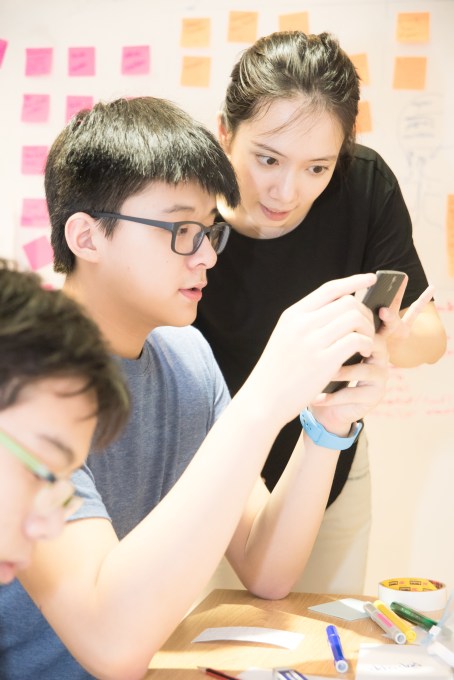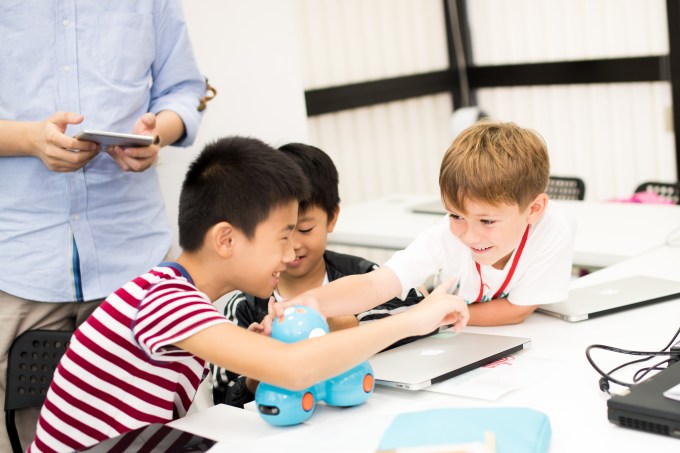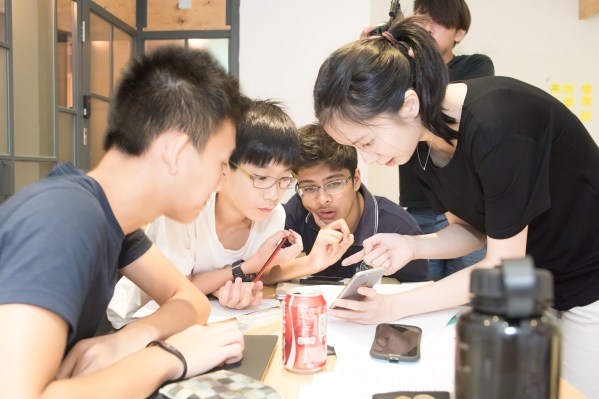As the #ILookLikeAnEngineer hashtag continues to gain traction, you’ll be hearing more about geeks who break the stereotypes of what programmers should be like. One such example is Michelle Sun, the founder of First Code Academy, a company that teaches schoolchildren as young as 6 years old how to code.
Like Isis Wenger, who reluctantly started the ILookLikeAnEngineer campaign after billboards with her on it attracted sexist responses, Sun is young, female, attractive and a coder. In the minds of many, one of those four things doesn’t fit with the others. Sun is doing her part to destroy that stereotype, and she’s taking it a few steps further.
Sun is a native of Hong Kong, where children are interviewed before they’re 3 years old for entrance into the most “prestigious” pre-schools, and students work hard to attain perfect grades at every level of the education system.
Academics trump all other interests. Rote memorization reigns supreme. Metro stops in Hong Kong are full of posters advertising academic tutors as though they were pop stars.
The goal for Hong Kongers? To get a stable job working in finance or banking, and work their way up the corporate ladder. But Sun doesn’t believe this is the ideal career path of the future. “We don’t need perfect students anymore,” she says. “We don’t need people who can regurgitate any bit of information from memory — Google can do that for us. What we need are people who are creating things to make the world a better place, and programming puts kids on this path.”
Sun started First Code Academy after stints with various startups, including Bump, which allowed users to share information by bumping their phones together (Google acquired Bump in 2013), and Buffer, a social media sharing and scheduling app. After Buffer, instead of working on “the next hot app,” Sun wanted to go in a different direction.
“I was inspired by the impact technology products can make in a wide audience,” Sun says. “I started coding when doing my first startup. I was working with a team of developers, and became curious about what goes on behind the scenes. I wanted to communicate better with engineers, so I started reading a bunch of books on coding.” Sun then attended Hackbright Academy, “the leading software engineering school for women,” to further her coding skills in a full time, intensive environment.

“At Hackbright I took part in hackathons hosted by large tech companies like LinkedIn and Dropbox,” Sun recounts, “and it convinced me of the limitless possibilities knowing how to code can lead to.”
While working in the Bay Area, Sun stumbled onto the opportunity to teach middle school girls how to code, and the experience led her to reflect on her education in Asia. When she returned to Hong Kong she decided to bring this type of education to kids in Asia. First Code Academy started as a one-day, girls-only coding workshop, but over the past two years it has grown to offer a range of courses to children (girls and boys) from 6 to 18.
“Our mission is to empower the next generation to become creators with technology,” Sun says. “The leaders of this generation will require a solid grasp of technology regardless of the field they work in, be it tech, medicine, law, or finance.”
That’s a sentiment echoed by Heather Zynczak, Chief Marketing Officer at Domo, which provides cloud-based business intelligence software. Like Sun, Zynczak also has a background as a coder, which she counts as being fundamental to her success in the top marketing role at Domo.
“When I started at Andersen Consulting, which is now Accenture, I coded,” she says. “I spent 80 hours a week writing computer programs and that experience has very much helped me, because I can talk to the CTO, I can choose software systems, and when someone brings up ‘multi-tenancy systems’ I know what they’re talking about.”
What we need are people who are creating things to make the world a better place, and programming puts kids on this path. Michelle Sun
She continues, “My tech background has helped me because marketing has become such a tech-heavy experience with analytics, systems, and everything digital.” Sun puts it this way: ”Coding is the next form of literacy. It’s the next language everyone needs to learn how to speak. The same way a lot of people are learning Mandarin to do business in and with China, coding is the new language not just of business, but for life in our society.”
First Code teaches classes in Hong Kong schools, as well as in their office. The company has a 5-year curriculum, which can start with students as young as six years old. Courses range from programming basics to more intensive classes that teach students how to build a complete app.
Parent-child workshops are also offered by the company in response to increased interest from parents who want to be directly involved in helping their children develop technical skills. It’s working. Three of First Code’s students traveled to Boston this last summer, at the invitation of MIT, to show off their apps. The company also has recently expanded its hands-on services to Singapore.

Sun says Asia is, in some ways, an ideal environment for coders. “Asia ranks high for math, science, and other disciplines that fit well with programming,” she says, “but the people graduating today weren’t exposed to it soon enough. We need to start much earlier than the university level. Just as kids tend to learn new languages better than adults, they can learn programming as just another hobby.”
Programming is also helping participants of First Code’s programs to develop other important life skills, some of which go against Asian cultural norms that frown on any sort of failure. Sun tells a story of a student who showed up barely able to speak in front of others because he was so nervous about making a mistake or saying the wrong thing.
“After two courses he’s now so confident he’s shouting out answers to questions,” she says. “He’s learned that it’s ok to make mistakes. When your app crashes, you find the problem, fix it, and try again until it works. Life operates the same way.”
Images: Kevon Cheung (First Code Academy)
